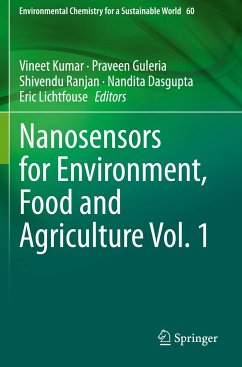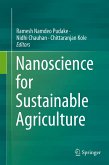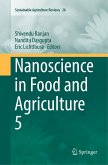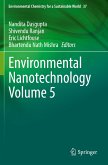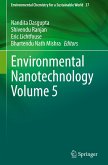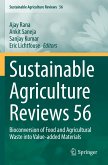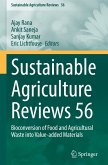Nanosensors for Environment, Food and Agriculture Vol. 1
Herausgegeben:Kumar, Vineet; Guleria, Praveen; Ranjan, Shivendu; Dasgupta, Nandita; Lichtfouse, Eric
Nanosensors for Environment, Food and Agriculture Vol. 1
Herausgegeben:Kumar, Vineet; Guleria, Praveen; Ranjan, Shivendu; Dasgupta, Nandita; Lichtfouse, Eric
- Broschiertes Buch
- Merkliste
- Auf die Merkliste
- Bewerten Bewerten
- Teilen
- Produkt teilen
- Produkterinnerung
- Produkterinnerung
Nanosensors enable us to specifically detect pollutants that can adversely affect the quality of life. This book covers the design, application and safety aspects of nanomaterial-based sensors. The focus is on nanosensors useful for application in Environment, Food and Agriculture. It discusses in detail the advances in nanosensor design and application. It also emphasizes on the strategies for toxicity assessment and safe use of nanosensors.
Andere Kunden interessierten sich auch für
![Nanoscience for Sustainable Agriculture Nanoscience for Sustainable Agriculture]() Nanoscience for Sustainable Agriculture113,99 €
Nanoscience for Sustainable Agriculture113,99 €![Nanoscience in Food and Agriculture 5 Nanoscience in Food and Agriculture 5]() Nanoscience in Food and Agriculture 5112,99 €
Nanoscience in Food and Agriculture 5112,99 €![Environmental Nanotechnology Volume 5 Environmental Nanotechnology Volume 5]() Environmental Nanotechnology Volume 5112,99 €
Environmental Nanotechnology Volume 5112,99 €![Environmental Nanotechnology Volume 5 Environmental Nanotechnology Volume 5]() Environmental Nanotechnology Volume 5112,99 €
Environmental Nanotechnology Volume 5112,99 €![Sustainable Agriculture Reviews 56 Sustainable Agriculture Reviews 56]() Sustainable Agriculture Reviews 56171,99 €
Sustainable Agriculture Reviews 56171,99 €![Sustainable Agriculture Reviews 56 Sustainable Agriculture Reviews 56]() Sustainable Agriculture Reviews 56171,99 €
Sustainable Agriculture Reviews 56171,99 €![Innovative Methods in Horticultural Crop Improvement Innovative Methods in Horticultural Crop Improvement]() Innovative Methods in Horticultural Crop Improvement149,99 €
Innovative Methods in Horticultural Crop Improvement149,99 €-
-
-
Nanosensors enable us to specifically detect pollutants that can adversely affect the quality of life. This book covers the design, application and safety aspects of nanomaterial-based sensors. The focus is on nanosensors useful for application in Environment, Food and Agriculture. It discusses in detail the advances in nanosensor design and application. It also emphasizes on the strategies for toxicity assessment and safe use of nanosensors.
Produktdetails
- Produktdetails
- Environmental Chemistry for a Sustainable World 60
- Verlag: Springer / Springer International Publishing / Springer, Berlin
- Artikelnr. des Verlages: 978-3-030-63247-2
- 1st edition 2021
- Seitenzahl: 280
- Erscheinungstermin: 17. März 2022
- Englisch
- Abmessung: 235mm x 155mm x 15mm
- Gewicht: 480g
- ISBN-13: 9783030632472
- ISBN-10: 3030632474
- Artikelnr.: 63453289
- Herstellerkennzeichnung Die Herstellerinformationen sind derzeit nicht verfügbar.
- Environmental Chemistry for a Sustainable World 60
- Verlag: Springer / Springer International Publishing / Springer, Berlin
- Artikelnr. des Verlages: 978-3-030-63247-2
- 1st edition 2021
- Seitenzahl: 280
- Erscheinungstermin: 17. März 2022
- Englisch
- Abmessung: 235mm x 155mm x 15mm
- Gewicht: 480g
- ISBN-13: 9783030632472
- ISBN-10: 3030632474
- Artikelnr.: 63453289
- Herstellerkennzeichnung Die Herstellerinformationen sind derzeit nicht verfügbar.
Dr. Vineet Kumar is currently working as Assistant Professor of Biotechnology in the School of Bioengineering and Biosciences, LPU, Jalandhar, Punjab, India. His areas of interest include natural plant product based green synthesis of nanoparticles, nanotoxicity testing of nanoparticles and application of nanoparticles in drug delivery, food technology, sensing, dye degradation and catalysis. He has published many articles in these areas featuring in peer-reviewed reputed journals. He is also serving as editorial board member and reviewer for international peer reviewed journals. He has received various awards like senior research fellowship, best poster award and postdoctoral fellowship etc. He has published two books for CRC, Taylor & Francis Group and 1 book each for Elsevier and Springer. Dr. Praveen Guleria is presently working as Assistant Professor in the Department of Biotechnology at DAV University, Jalandhar, Punjab, India.She has worked in the areas of Plant Biotechnology, Plant Metabolic Engineering and Plant Stress Biology at CSIR- Institute of Himalayan Bioresource Technology, Palampur, H.P. India. Her research interests include plant stress biology, plant small RNA Biology, plant epigenomics and nanotoxicity. She has published several research articles in various peer-reviewed journals. She is also serving as the editorial board member and reviewer for certain international peer reviewed journals. She has been awarded the SERB- Start Up Grant by DST, GOI. She has also been awarded the prestigious "Bharat Gaurav Award" in 2016 by the India International Friendship Society, New Delhi. She has also received various awards like CSIR/ ICMR- Junior research Fellowship, CSIR- Senior research fellowship, State level merit scholarship awards. She has published one book each for Elsevier, Springer and CRC, Taylor & Francis Group. She is in final phase of editing 3 books for Springer. Dr. Nandita Dasgupta has vast working experience in nanoscience and is working as Assistant Professor at Department of Biotechnology, Institute of Engineering and Technology, Lucknow, India. She has worked on Mesenchymal stem cell derived exosomes for the treatment of uveitis. She has successfully engineered micro-vehicles for model drug molecules. Her areas of interest include nanomaterial fabrication and its applications in medicine, food, environment, agriculture and biomedical. She is the associate editor of Environmental Chemistry Letters. She has received several awards and recognitions from different national and international organizations. Dr. Shivendu Ranjan is scientist at the Chaperon Biotech, SIDBI Centre, Indian Institute of Technology, Kanpur, India. He is also serving as a senior research associate, adjunct, at the Faculty of Engineering and Built Environment, University ofJohannesburg, South Africa. His research interests include nanotechnology, nanomedicine, science policy and diplomacy.He is associate editor of Environmental Chemistry Letters and editorial board member of Biotechnology and Biotechnological Equipment. He has received 20 awards and honors. Dr. Eric Lichtfouse is an environmental chemist at the University of Aix-Marseille, France, and visiting professor at Xi'an Jiaotong University, China. He has invented carbon-13 dating. He is teaching scientific writing and communication, and has published the book Scientific Writing for Impact Factors. He is founder and Chief Editor of scientific journals and series in environmental c hemistry and agriculture. He got the Analytical Chemistry Prize from the French Chemical Society, the Grand Prize of the Universities of Nancy and Metz, and a Journal Citation Award by the Essential Indicators.
Chapter 01 Sensors for the Detection of Heavy Metal Contaminants in Water and Environment.- Chapter 02 Nanosensors for Heavy Metal Detection in Environmental Media: New Trends and Recent Advances.- Chapter 03 AIE-Based Fluorescent Nanosensors for the Detection of Heavy Metal Ions.- Chapter 04 Nanosensors based on lipid films for environmental applications.- Chapter 05 Novel Chemical Sensors Based On Green Composite Materials For Environmental Analysis.- Chapter 06 Toxicology and Safety Aspects of Nanosensor on Environment, Food and Agriculture.- Chapter 07 Nanosensors Used for Detection of Fertilizers and Other Agricultural Applications.- Chapter 08 Sensors for the Detection of Food Contaminants.- Chapter 09 Nanotechnology-Based Approaches for Sensing And Remediation of Mycotoxins in Food and Agriculture.- Chapter 10 Detection of toxic contaminant in food items.- Chapter 11 Nanosensors Based on Lipid Membranes for the Rapid Detection of Food Toxicants.- Chapter 12 Utility of Nanobiosensors in environmental analysis and Monitoring.
Chapter 01 Sensors for the Detection of Heavy Metal Contaminants in Water and Environment.- Chapter 02 Nanosensors for Heavy Metal Detection in Environmental Media: New Trends and Recent Advances.- Chapter 03 AIE-Based Fluorescent Nanosensors for the Detection of Heavy Metal Ions.- Chapter 04 Nanosensors based on lipid films for environmental applications.- Chapter 05 Novel Chemical Sensors Based On Green Composite Materials For Environmental Analysis.- Chapter 06 Toxicology and Safety Aspects of Nanosensor on Environment, Food and Agriculture.- Chapter 07 Nanosensors Used for Detection of Fertilizers and Other Agricultural Applications.- Chapter 08 Sensors for the Detection of Food Contaminants.- Chapter 09 Nanotechnology-Based Approaches for Sensing And Remediation of Mycotoxins in Food and Agriculture.- Chapter 10 Detection of toxic contaminant in food items.- Chapter 11 Nanosensors Based on Lipid Membranes for the Rapid Detection of Food Toxicants.- Chapter 12 Utility of Nanobiosensors in environmental analysis and Monitoring.

